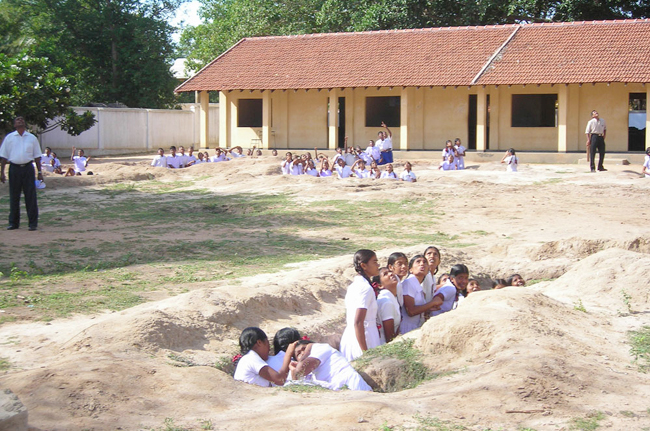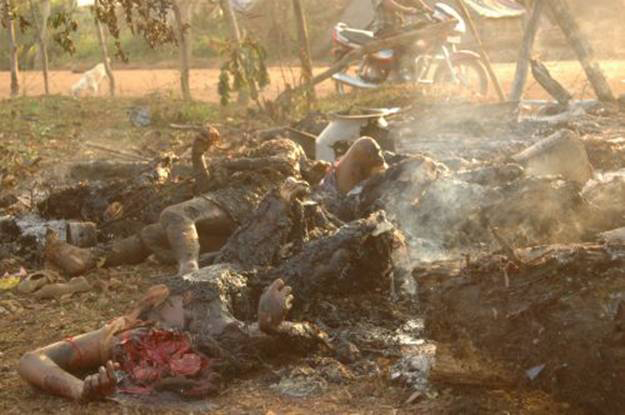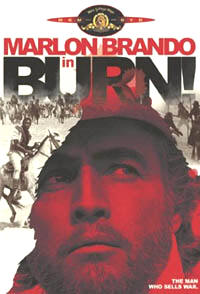>
The Sinhala owned
Sri Lanka Sunday Times reported on 22
February that the donor Co-Chairs are working
out a coalition humanitarian task force spearheaded by
the United States, to evacuate civilians trapped in the
fighting in the Vanni. It said -
"The purpose will be purely to facilitate the
movement of civilians from the northeastern coast to a
ship in the deep seas. This is for transfer
to Internally Displaced Person (IDP) centres or
hospitals outside the battle zones."
The proposed transfer to IDP centres will need to be
understood in the context of the
London Daily Telegraph report of 13 February 2009
-
"(Sri Lanka) Officials have confirmed they will
establish several "welfare villages" to house the
estimated 200,000 Tamils displaced from their homes by
the Sri Lankan army's "final offensive" against the
LTTE's stronghold on the north of the Island. Senior
officials have however confirmed that those housed in
the villages will have no choice on
whether to stay in the camps.
It appears that what I wrote on 29
January 2009 in Sinhala Sri Lanka's
Genocide of Eelam Tamils - a Crime Against Humanity,
is now coming to pass -
"...the international community
will wait till Tamil resistance is sufficiently
weakened or annihilated before it attempts to intervene 'on
humanitarian grounds' and in seeming response to 'world
wide Tamil appeals'. Meanwhile the IC will even
welcome such world wide appeals by Tamils as that will
pave the way (and establish useful contact points
amongst the Tamil diaspora) for IC's eventual
intervention with 'development aid' with the mantra of
not conflict resolution but 'conflict transformation'."
It was the Buddha who said said that suffering is a
great teacher. The Tamil people are being taught on the
hard anvil of death and suffering appropriately enough in
Buddhist Sri Lanka that human rights
and humanitarian laws are more often than not, political
instruments - instruments which States use selectively so
that they may intervene to advance their own perceived
strategic interests.
Having banned the LTTE which was
the armed resistance of the people of Tamil Eelam and
which could have protected the people of Tamil Eelam
against the genocidal onslaught
by Sinhala ethno nationalism;
- having called
upon the LTTE to surrender to those same armed
forces so that Tamils may be saved from
genocide;
- having failed to condemn the
Sinhala army's brutal genocidal attacks as
genocide but on the contrary having armed and trained
the Sinhala armed forces;
- having failed to condemn
the
shelling by Sri Lanka of self announced safety
zones, which killed hundreds of Tamils and gravely injured many
thousands more;
- having failed to prevent Sri
Lanka's deliberate targeting of hospitals;
- having refused to recognise
that Sri Lanka's resort to genocide was no accident but
is directed to give Tamil civilians a clear
message � �get away
from the LTTE controlled areas or die�
and therefore a war
crime;
- having failed to prevent
Sri Lanka from ordering
humanitarian
organisations to leave the war-affected
areas
- having failed to condemn Sri
Lanka for preventing the media from entering these
areas as deliberate actions directed to facilitate a
genocidal war without witnesses;
- having refused to admit to
the horrific truth that faced with the unity of a whole
people in their struggle for freedom from alien Sinhala
rule, Sri Lanka has resorted to the anti guerrilla
strategy of the genocidal destruction of that
people, in other words, the civilians, women and
children;
- having suggested that Tamil
civilians are 'trapped in the fighting in the Vanni'
when in truth Tamil civilians are not 'trapped in the
fighting' or in the crossfire but are being
deliberately targeted and killed by Sri Lanka armed
forces;
- having done all this
-
the co-chairs now propose a
'humanitarian operation', assisted by the United States
Pacific Command (US PACOM) to evacuate civilians 'trapped
in the fighting' in the Vanni.
Meanwhile, India's acting Prime
Minister Pranab Mukherjee told the Lok Sabha in New
Delhi on Wednesday 18 February that his Government had
formally offered assistance including logistic support to
evacuate civilians caught up in the battle zone. He said
the Sri Lanka Government had accepted the offer based on
the fact that it was coming from a 'friendly country.'
Mr. Mukherjee's concern for Tamil civilians would have
been touching if not for his words in the Lok Sabha on
23 October 2008 -
�We have a very comprehensive
relationship with Sri Lanka. In our anxiety to protect
the civilians, we should not forget the strategic
importance of this island to India's interests,...
especially in view of attempts by countries like
Pakistan and China to gain a strategic foothold in the
island nation...Colombo had been told that India would
"look after your security requirements, provided you do
not look around". "We cannot have a playground of
international players in our backyard." Indian
External Affairs Minister Pranab Mukherjee, 23 October
2008
At that time in October 2008, when
Tamil civilians were being targeted and killed by Sinhala
Sri Lanka's armed forces which New Delhi had armed and
trained, Mr.Mukherjee urged his Parliamentary colleagues
that in their anxiety to protect Tamil civilians, they
should not forget the strategic importance of Sri Lanka
to India's interests.

Now that Tamil villages have been
bombed and shelled and Tamil civilians have been driven
from their homes
into so called 'welfare villages' which they cannot
leave, and Tamil armed resistance to Sinhala rule has
been weakened, Mr.Mukherjee has formally offered
assistance to 'friendly Sri Lanka' to evacuate Tamil
civilians somehow 'caught up' in the battle
zone!

And Sri Lanka has accepted the
offer coming as it does from a 'friendly country' which
had been told by India that ' we will look after your
security concerns, if you do not look around.' After all
what are good friends for if they cannot help each other
in time of need.
Again
predictably, the United Kingdom engaged in playing the
soft spoken Jeff role has voiced
its support for a call by Mexico for a briefing on the
situation in Sri Lanka at the UN Security Council. The
real politick nature of the whole exercise was exposed by
Russia opposing the Mexico call. And one would imagine
that Russia would not have acted without consultation
with New Delhi. Given the changing dynamics of the
US-India-China relations and an emerging bi polar world, it
should not surprise if New Delhi had turned to its old
friend Russia.
'Humanitarian intervention' to
prevent the humanitarian tragedy that is taking place in
the Tamil homeland, had it been early, would have been
kind. But the belated attempts that are being made today
expose not the humanitarian concerns of the international
actors but the strategic interests that impel the
international actors to act the way they do.
After all the simplest thing that
the international actors could have done to protect the
Tamil people would have been to remove the ban on the
LTTE so that the capacity of the people of Tamil Eelam to
resist the genocidal onslaught launched on them by
Sinhala Sri Lanka may have been strengthened. The simple
and humane thing that the international actors could have
done was
not to taunt the struggles against terrorism with the
label terrorism but to adopt a principle centered
approach which liberated political language and also
helped to liberate a people who have taken up arms as a last resort in their struggle
for freedom from oppressive alien Sinhala rule.
Now that
Tamil resistance has been weakened, international actors
who have armed and trained Sinhala Sri Lanka's genocidal
armed forces believe that the time has come to respond to
the 'humanitarian disaster' which they helped to create.
If the LTTE is totally annihilated, they fear that they
may lose an important lever to ensure that Sri Lanka
'plays ball' in the Indian Ocean
region. Again, they are concerned that more genocide
will create thousands more martyrs. And they are
right.
"...in martyrdom there is an incalculable spiritual
magnetism which works miracles. A whole nation, a whole
world catches the fire which burned in a few hearts;
the soil which has drunk the blood of the martyr
imbibes with it a sort of divine madness which it
breathes into the heart of all its children, until
there is but one overmastering idea, one imperishable
resolution in the minds of all beside which all other
hopes and interests fade into insignificance and until
it is fulfilled, there can be no peace or rest for the
land or its rulers." Sri
Aurobindo on the Strength of an Idea,
1907
"..But imagine it happens: Killinochchi is flattened, Mr P is
dead, LTTE dissolved. Will the Tamil dream of a Tamil Eelam die? Of
course not. It will be revived, and new cycles of
violence will occur..."
Conflict Resolution in Tamil Eelam - Sri Lanka: the
Norwegian Initiative- Professor Johan Galtung, February
2007
Genocide is not the path to secure
stability in the Indian Ocean region - as the self
immolation of
Muthukumar,
Ravichandran,
Thamil Venthan,
Sivaprakasam and Murukuthasan
show. But it is not simply
stability that the international actors are concerned
with. Each of the international actors are also concerned
to use the humanitarian disaster facing the people of
Tamil Eelam to embed their own influence more securely in
the island of Sri Lanka (both in
the Sinhala south and in the Tamil north) - and so they
jockey amongst themselves as to how best to intervene.
Each is also concerned that if one does not, the other
may.
 And it is not
everybody who will welcome an intervention spearheaded by
the United States
Pacific Command (US PACOM). Hence the efforts to
assemble a 'coalition of the willing'. The US message to
New Delhi was loud and clear: 'We lead, you follow'. I
said it some two years ago in Black Pebbles & White Pebbles
- And it is not
everybody who will welcome an intervention spearheaded by
the United States
Pacific Command (US PACOM). Hence the efforts to
assemble a 'coalition of the willing'. The US message to
New Delhi was loud and clear: 'We lead, you follow'. I
said it some two years ago in Black Pebbles & White Pebbles
-
"...US and India may find common cause
in 'weakening' the Tamil Eelam struggle for freedom
(and the LTTE) - but weaken it in such a way that
thereafter each of them may
successfully jockey (against each other) for position
and influence in the Indian Ocean region. The 'weakening' in
this context means the isolation and annihilation of
Velupillai Pirabakaran and securing an LTTE under a
'reformed' leadership."
The
international actors may believe that a people who have
been bombed, shelled, rendered homeless, starving and who
have seen their near and dear die whilst they looked on
helplessly, are also stupid - but the people of Tamil
Eelam, whatever else they may be, are not stupid.
Perhaps, some of the international actors may want to
learn by taking time off to see Gillo
Pontecorvo's film Queimada (Burn!) - a film seen by many
Tamils, young and old, in the Vanni. It is a film which
"portrays, quite brilliantly, the nature of a guerrilla
uprising. Walker (the British mercenary) seems all too
aware of the danger of a popular uprising, when he
cautions the white rulers that ...in killing a hero of
the people, the hero 'becomes a martyr, and the martyr
becomes a myth.'"1
 "...Walker, the British mercenary, pursues
Dolores the rebel leader ruthlessly, burning half the
island while uprooting and killing people, animals and
vegetation in his path. He develops a theory that the
guerrillas can be defeated only if the peasants among
whom they take shelter and who supply them are burnt
and driven out of all their villages. The vegetation
and trees must be denuded since they too hide the
rebels. The logic of defeating a popular movement is
inexorably genocidal, entailing total
devastation. "...Walker, the British mercenary, pursues
Dolores the rebel leader ruthlessly, burning half the
island while uprooting and killing people, animals and
vegetation in his path. He develops a theory that the
guerrillas can be defeated only if the peasants among
whom they take shelter and who supply them are burnt
and driven out of all their villages. The vegetation
and trees must be denuded since they too hide the
rebels. The logic of defeating a popular movement is
inexorably genocidal, entailing total
devastation.
Dolores is finally captured and hanged,
refusing Walker's "offer" to escape. Dolores has
learned that freedom must be seized in struggle. And he
knows the offer to free him is designed to demonstrate
his subordination. He also realizes that Walker,
having smashed the rebellion, wants to avoid creating a
martyr and a legend. Dolores, in cool defiance, prefers
death as his fulfilment...
The young boy who guards the captured
Dolores stays with him and provides Pontecorvo with a
means of allowing Jose Dolores to give his ideas
expression through dialogue. Jose Dolores does not
assail his captor; he tries to inspire and convert him.
He tells the young man that he does not wish to be
released because this would only indicate that it was
convenient for his enemy. What serves his enemies is
harmful to him. "Freedom is not something a man can
give you," he tells the boy...
The last interview between Walker and
Dolores is powerful. Walker desperately wishes to set
Dolores free. Dolores refuses to speak to him. The
camera focuses on the face of Brando who, having been
superseded in his superiority and moral strength by
Dolores as a mature revolutionary, cannot understand
why a man would give up his life if he has a chance to
escape. Dolores has purpose and meaning in his life.
Walker by this time has none and only now is
confronted, looking at the transformed Dolores, by what
Pontecorvo has called "his own emptiness." ..
Pontecorvo zooms to Walker as he
listens to Dolores' final message which breaks his
silence: "Ingles, remember what you said. Civilization
belongs to whites. But what civilization? Until
when?"
His business finished, Walker is
stabbed to death on the dock by a porter a moment
before embarking. The stabbing of Walker on his way to
the ship by an angry rebel comes simultaneously with a
repetition of the Algerian cry for freedom.
Quemada's people are awakened, emboldened, and
irreconcilable. The camera pans to many worn faces,
their rebellion unchecked and the example of Dolores
burned into their consciousness." Joan
Mellen - Queimada - Gillo Pontecorvo's Burn!,
1972
But, then again, it may be that the international
actors have seen the film and that is why they are acting
the way they do. And it may be that they have also read
Lieutenant General S.C. Sardesh Pande
-
".. I was left
with the impression that the LTTE was the expression of
popular Tamil sentiment and could not be destroyed, so
long as that sentiment remained... Our
unit and formation commanders too came under the mental
hypnosis of the LTTE. They would graphically explain
how well entrenched the LTTE was in the minds of the
people, how ungrateful people were to us, how elusive
the LTTE was, how perfect it was in the midst of the
people and in its actions, how effective was its grip
over the public and so on - virtually admitting that it
was an impossible task and all our endeavours were
pointless... " - Lieutenant General S.C. Sardesh
Pande, UYSM, AVSM, Divisional Commander of
IPKF 54 Infantry Division in Sri Lanka, later Deputy
GOC, Headquarters IPKF, Madras in "Assignment
Jaffna", published in 1992
|